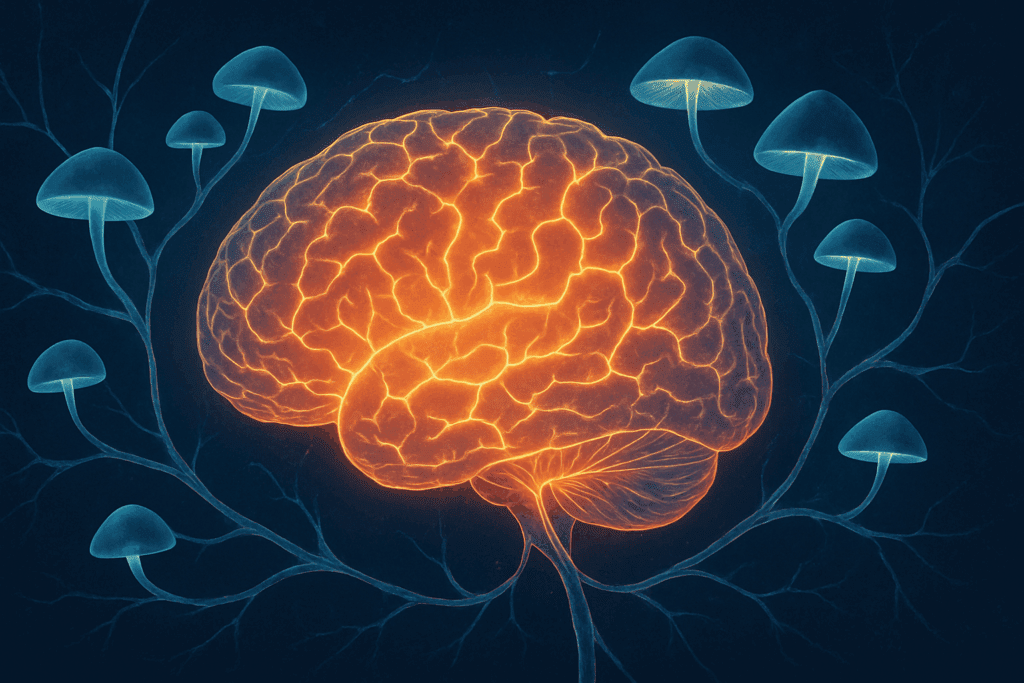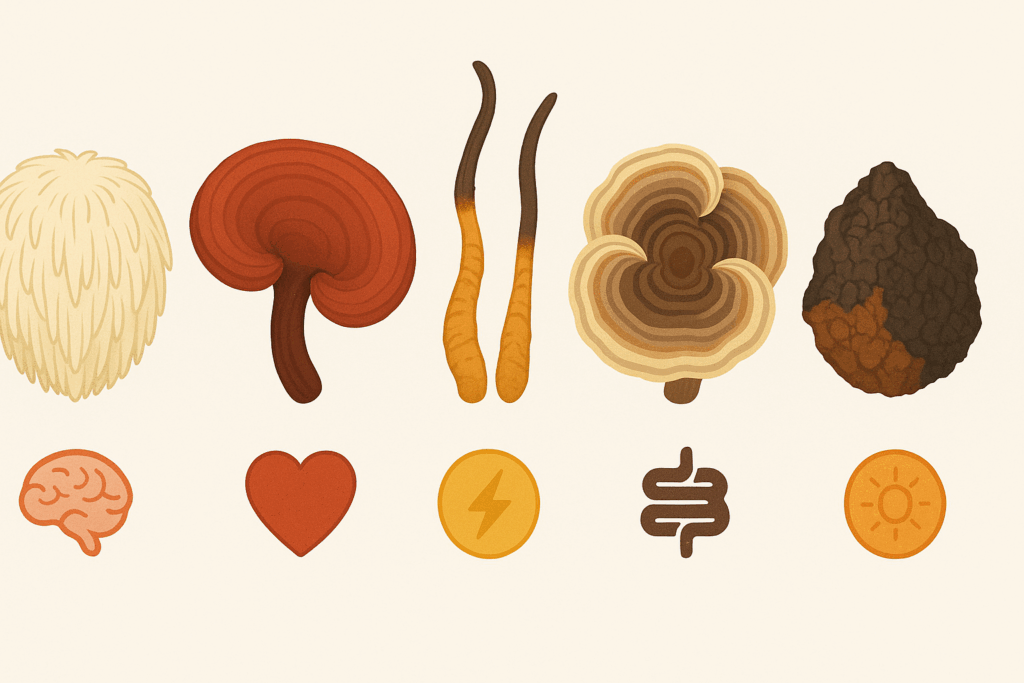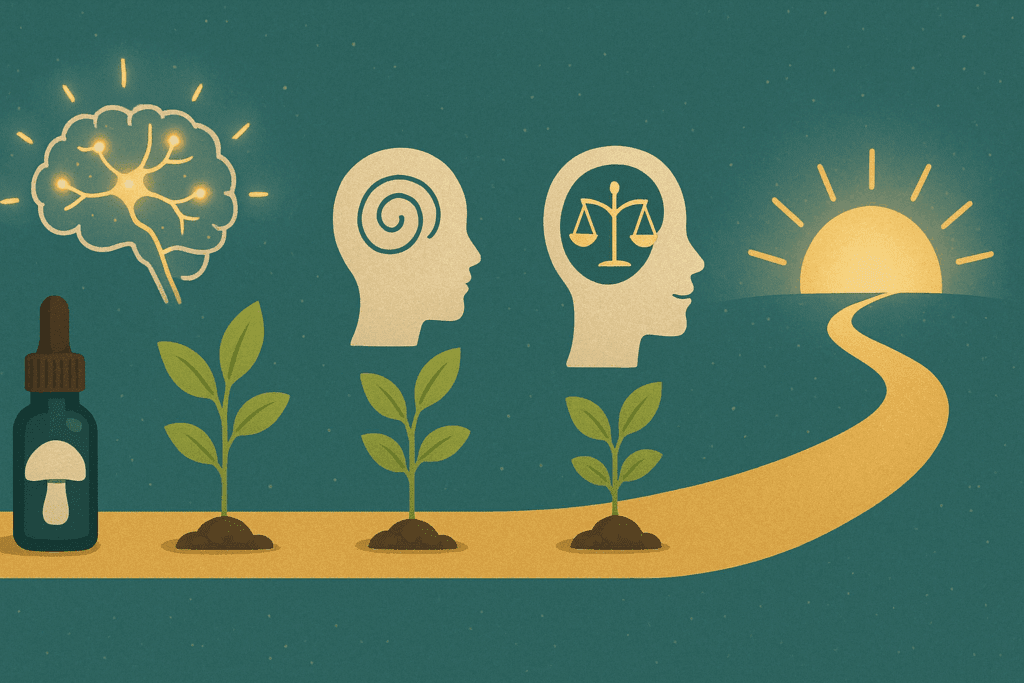Unlocking the Mind: The Rise of Natural Nootropics
In a fast-paced world where information overload is the norm and cognitive performance is paramount, the demand for effective nootropics has surged dramatically. Among the most intriguing of these emerging solutions is the mushroom tincture. With centuries of use in traditional medicine and growing interest in the wellness community, the benefits of mushroom tincture are now being explored through a modern, scientific lens. These potent extracts, derived from a range of medicinal fungi, are gaining attention for their potential to enhance memory, improve focus, and support overall brain health. The focus on this natural remedy isn’t merely a passing trend; rather, it reflects a broader movement toward functional nutrition and holistic cognitive care.
The idea that mushrooms are good for your brain isn’t new. Ancient Eastern medical systems such as Traditional Chinese Medicine (TCM) and Ayurveda have long revered mushrooms like Lion’s Mane and Reishi for their mind-supporting properties. But what sets tinctures apart is their potency and bioavailability. By extracting beneficial compounds through alcohol or dual-extraction methods, tinctures allow for more effective absorption and utilization by the body. As researchers continue to explore what mushroom extract does in the context of neuroprotection and mental clarity, the evidence for its efficacy continues to grow. This article will dive deep into how mushroom tinctures can powerfully support your cognitive journey, especially when used regularly as part of a daily wellness routine.
You may also like: The Ultimate Guide to the Best Nootropic Mushrooms for Memory and Cognitive Enhancement

What Is a Mushroom Tincture?
To understand the benefits of mushroom tincture, it’s important first to grasp what a tincture is and how it differs from other forms like capsules or powders. A tincture is a concentrated liquid extract typically made by soaking dried mushrooms in alcohol or a combination of alcohol and water. This method draws out the active compounds, including beta-glucans, terpenoids, and polyphenols, which are believed to be responsible for mushrooms’ nootropic and adaptogenic properties.
Unlike powdered supplements, which may degrade over time or pass through the digestive system less efficiently, tinctures are absorbed quickly and directly into the bloodstream when placed under the tongue. This makes them a particularly appealing choice for those seeking fast-acting cognitive benefits. Additionally, tinctures can be tailored to specific needs, combining multiple mushroom species into a synergistic blend that supports memory, focus, and mental clarity.
The question of “what does mushroom extract do” is best answered by examining these bioactive compounds. For instance, hericenones and erinacines in Lion’s Mane are known to stimulate the synthesis of nerve growth factor (NGF), a protein that plays a critical role in maintaining and regenerating neurons. This is one reason Lion’s Mane is a standout in any mushroom complex supplement aimed at brain health. Similarly, cordycepin found in Cordyceps may enhance ATP production, boosting mental energy and endurance.

The Science Behind Cognitive Enhancement
Scientific research has begun to validate what many traditional healers have known for centuries: certain mushrooms have profound effects on brain function. Studies on Lion’s Mane, for example, have shown promising results in improving mild cognitive impairment and stimulating neurogenesis. This process—the creation of new neurons—is essential for learning, memory, and adapting to new information.
Reishi, another star in the functional mushroom world, is rich in triterpenes that may support mood regulation by interacting with the brain’s GABA receptors. Although often categorized for its immune-supporting properties, Reishi also contributes to mental wellness by promoting calm focus and reducing anxiety, which in turn supports clearer thinking.
When considering the best mushrooms for health, cognitive enhancement ranks high among the desired outcomes. The mushroom blend powder benefits found in formulas that combine Lion’s Mane, Cordyceps, and Reishi are often greater than those of single-species products. Such synergistic combinations work on multiple aspects of brain health—from cellular energy and neuroprotection to emotional regulation and memory formation.

The Benefits of Mushroom Tincture for Brain Function
The benefits of mushroom tincture extend beyond simple mental stimulation. One of the most compelling advantages is its ability to support long-term brain health. The antioxidants found in mushrooms like Chaga and Turkey Tail combat oxidative stress, which is a key contributor to age-related cognitive decline. These antioxidants help preserve neuronal integrity and enhance the brain’s resilience against environmental and metabolic stressors.
For students, professionals, and anyone engaged in cognitively demanding tasks, mushroom tinctures offer a natural alternative to synthetic stimulants. Unlike caffeine or pharmaceutical nootropics, these extracts typically do not lead to jitters, crashes, or dependency. Instead, users often report a subtle, sustained enhancement in concentration, information retention, and mental clarity.
Another vital point to consider is neuroplasticity—the brain’s ability to reorganize itself by forming new neural connections. Certain functional mushrooms stimulate pathways associated with plasticity, suggesting that regular use of mushroom tinctures could not only enhance immediate focus but also improve learning capacity over time. When asking, “do mushroom supplements work?” it’s essential to consider these long-term benefits alongside more immediate effects.
Exploring the Benefits of Mushroom Tincture for Memory
Among the most exciting aspects of mushroom tincture usage is its impact on memory. Lion’s Mane continues to lead the charge, thanks to its demonstrated effects on nerve growth and synaptic plasticity. The regular intake of Lion’s Mane tincture has been linked to improvements in both short-term and long-term memory, particularly among older adults experiencing cognitive decline.
Studies in both animals and humans suggest that this mushroom may help reverse memory loss associated with neurodegenerative conditions such as Alzheimer’s disease. This is particularly relevant for those exploring whether mushroom extract benefits could be a viable adjunct to conventional treatment options. While more research is needed to draw definitive conclusions, the early evidence is promising and supports ongoing clinical exploration.
When combined with adaptogens such as Rhodiola or Ashwagandha, mushroom complex supplement benefits may also include stress resilience, which indirectly supports better memory. Chronic stress impairs hippocampal function—a brain region essential for memory processing. By modulating the body’s stress response, mushrooms help maintain the neurobiological conditions necessary for healthy recall and cognitive flexibility.

Why Focus Improves with Mushroom Tinctures
Focus, like memory, is influenced by a wide range of neurochemical and physiological factors. Cordyceps mushrooms, often included in mushroom blends for their energizing properties, are known to improve oxygen utilization and support mitochondrial function. This translates into more mental stamina and sharper attention, particularly during extended periods of intellectual effort.
Reishi and Chaga play an equally important role by reducing inflammation and promoting balanced neurotransmitter activity. This is critical because inflammation in the brain—often stemming from poor diet, stress, or environmental toxins—can lead to brain fog and difficulty concentrating. The anti-inflammatory effects of these mushrooms help clear mental clutter, enabling a state of relaxed alertness that is ideal for productive work and learning.
The question “what does mushroom powder do for you” is answered clearly when considering these effects. Powdered or tinctured, the right combination of functional mushrooms provides the body with tools to better manage stress, support energy metabolism, and maintain mental clarity. These are the foundational pillars of sustained focus.
Are Mushroom Extracts Safe for Daily Use?
For individuals exploring natural cognitive enhancers, safety is a primary concern. So, are mushroom extracts safe? Generally speaking, the answer is yes—when sourced from reputable providers and used as directed, mushroom tinctures and extracts are well-tolerated and have a low risk of adverse effects. This is especially true when they are prepared using dual extraction methods that eliminate potentially harmful compounds while preserving beneficial ones.
However, it’s important to recognize that not all mushroom products are created equal. Low-quality supplements may contain fillers, contaminants, or ineffective dosages. Therefore, choosing a high-quality mushroom complex supplement is essential. Consulting with a healthcare provider before beginning any new supplement regimen is also advisable, particularly for individuals with underlying health conditions or those taking prescription medications.
Functional mushrooms benefits are most pronounced when the supplement is integrated into a broader lifestyle of wellness. This includes proper sleep, hydration, physical activity, and a balanced diet. In such contexts, mushroom tinctures serve as powerful allies in the pursuit of cognitive excellence without the risks associated with some pharmaceutical alternatives.
How Much Mushroom Powder Per Day Is Ideal?
Another common question among new users is how much mushroom powder per day provides optimal results. The answer depends on the specific mushroom type, method of preparation, and the individual’s health goals. However, most experts recommend starting with a lower dose—typically between 500 and 1,500 milligrams per day—and adjusting as needed based on response and tolerance.
When using tinctures, the dosage is usually measured in milliliters, with one to two dropperfuls per day being standard. Tinctures are often more potent than powders, so users should follow the manufacturer’s guidelines and listen to their bodies. It’s worth noting that benefits accumulate over time, and consistency is key. Regular use is more effective than sporadic intake, especially when targeting cognitive enhancement.
Mushroom blend powder benefits are also influenced by timing. Some users find that taking Lion’s Mane in the morning supports daytime cognition, while Reishi may be more beneficial in the evening due to its calming effects. By aligning the use of each mushroom with its physiological properties, one can fine-tune their nootropic regimen for optimal outcomes.

Gender-Specific Applications: Mushroom Benefits for Women and Men
The appeal of mushrooms for brain health transcends gender, but there are specific mushroom complex benefits for women and men that deserve mention. For women, functional mushrooms like Reishi and Cordyceps may support hormonal balance, reduce PMS symptoms, and boost energy without overstimulating the nervous system. These qualities are particularly valuable in managing the cognitive fluctuations associated with the menstrual cycle or menopause.
Lion’s Mane and Chaga are also considered valuable mushrooms for women due to their antioxidant and anti-inflammatory effects, which contribute to skin health, immune resilience, and mental focus. The mushroom complex benefits for women are amplified when these fungi are part of a holistic wellness plan that includes nutrient-rich foods and stress reduction practices.
For men, mushroom complex benefits often include enhanced physical stamina, libido, and stress management. Cordyceps, in particular, has been studied for its impact on testosterone and endurance, making it a popular choice among athletes and biohackers. Ultimately, the right mushroom blend can provide cognitive and physiological support tailored to individual needs, regardless of gender.
The Healing Power of Functional Mushrooms
The idea of healing mushrooms goes beyond their cognitive effects. These fungi interact with nearly every major system in the body, from the immune and endocrine systems to the gut-brain axis. This holistic action is why functional mushrooms are considered “adaptogens,” helping the body adapt to stressors and maintain internal balance.
One of the more exciting developments in this area is the growing understanding of the gut-brain connection. Are mushrooms good for your gut? Yes—and by supporting gut microbiota, reducing inflammation, and enhancing nutrient absorption, mushrooms help create the conditions necessary for optimal brain function. When the digestive system is healthy, neurotransmitter production is balanced, and mood and memory improve.
Moreover, are mushrooms heart healthy? The answer is increasingly supported by research. Many functional mushrooms contain compounds that regulate blood pressure, lower cholesterol, and improve circulation. These cardiovascular benefits contribute indirectly to cognitive health by ensuring the brain receives ample oxygen and nutrients. This intersection of brain, gut, and cardiovascular health illustrates the comprehensive benefits of mushroom tinctures.

Understanding Mushroom Complex and Mushroom Extract Benefits
What is mushroom complex good for? The term “mushroom complex” typically refers to a blend of several medicinal mushrooms combined to offer broad-spectrum benefits. These blends often include Lion’s Mane, Cordyceps, Reishi, Turkey Tail, and Chaga—each contributing unique compounds and effects.
Mushroom complex supplement benefits are amplified through this synergy. Rather than targeting a single pathway, these blends support multiple systems at once, offering balanced energy, enhanced immunity, improved digestion, and cognitive clarity. The mushroom extract benefits in such complexes provide a comprehensive solution for those seeking both immediate and long-term enhancements to health and performance.
It’s important to emphasize that the roots of mushrooms—known as mycelium—also contain valuable compounds. Mushroom roots benefits are often overlooked, yet they include prebiotic fibers that feed beneficial gut bacteria, as well as antioxidants that protect against cellular damage. A well-formulated mushroom tincture or complex will include both fruiting bodies and mycelium for full-spectrum efficacy.
What Does Mushroom Complex Do for Your Brain?
By now, it should be clear that mushroom complex supplements offer a robust set of cognitive advantages. But what does mushroom complex do on a neurological level? The most significant effects include stimulating neurogenesis, enhancing synaptic plasticity, improving mood regulation, and reducing mental fatigue. These benefits are achieved through various mechanisms, including increased NGF production, improved mitochondrial function, and modulation of neurotransmitter levels.
The impact is not merely biochemical. Users often report qualitative changes: clearer thinking, faster recall, better problem-solving, and even heightened creativity. Such effects are especially valuable in academic, professional, and creative settings, where mental agility and stamina are critical. Thus, the benefits of mushroom tincture and complex blends are both scientifically grounded and experientially rich.
Integrating Mushroom Tinctures into Daily Wellness Routines
To fully harness the benefits of mushroom tincture, consistency and intention are key. A thoughtfully integrated regimen can yield more noticeable cognitive and physiological results over time. Whether taken first thing in the morning to jump-start mental clarity or at night to aid with rest and emotional balance, the timing of use matters. For instance, a few drops of Lion’s Mane tincture under the tongue during your morning routine can enhance alertness and learning capacity, while a Reishi tincture taken in the evening may help ease the transition into restorative sleep. These small but intentional steps build a foundation for long-term neuroprotection and performance enhancement.
It’s also helpful to pair mushroom tinctures with other lifestyle strategies to enhance their effects. Regular physical activity, such as aerobic exercise or yoga, increases brain-derived neurotrophic factor (BDNF), which works synergistically with nerve growth factors promoted by Lion’s Mane. Likewise, mindfulness practices like meditation can amplify the mood-stabilizing effects of Reishi or Chaga. In this way, mushroom tinctures don’t act in isolation but become powerful tools within a broader system of wellness practices that enhance memory, focus, and emotional well-being.
For busy professionals, students, or creatives juggling multiple responsibilities, establishing a daily routine that includes a mushroom complex supplement may serve as a form of preventive health. By reducing inflammation, enhancing mitochondrial function, and balancing neurotransmitter levels, these extracts provide a buffer against burnout and cognitive fatigue. When combined with a nutrient-dense diet and adequate hydration, mushroom tinctures help form a holistic, sustainable approach to mental vitality.

Daily Mushrooms and the Long-Term View on Brain Health
One of the most compelling arguments for integrating mushroom tinctures into a daily routine is their cumulative effect. Unlike quick-fix solutions that offer momentary boosts with potential downsides, the long-term use of functional mushrooms cultivates resilience at the cellular level. This is especially critical when considering age-related cognitive decline, as many of the compounds found in mushroom extract directly support neurogenesis and synaptic maintenance.
The term “daily mushrooms” refers not just to frequency but to a lifestyle philosophy—using nature’s most powerful fungi as consistent allies in the quest for optimal health. Research suggests that regular intake of Lion’s Mane, Cordyceps, and Reishi can lead to measurable improvements in verbal learning, memory retention, and task switching. This makes mushroom complex benefits an attractive option for older adults looking to preserve independence and cognitive agility, as well as younger individuals focused on maximizing their performance.
Moreover, taking mushroom tinctures daily encourages a deeper connection with natural rhythms. Unlike stimulants that disrupt sleep cycles or induce dependency, mushrooms modulate internal systems gently, guiding the body toward equilibrium. This gradual but profound recalibration makes them ideal for those seeking sustainable cognitive support. It also explains why the benefits of mushroom tincture often become more noticeable with each passing week, reinforcing the value of long-term commitment.
Unlocking the Benefits of Mushroom Tincture: Expert FAQ for Brain and Body Wellness
1. What are the most effective ways to use mushroom tinctures for cognitive benefits?
While taking mushroom tinctures sublingually is the most common approach for fast absorption, some users find enhanced effects by pairing them with fat-rich foods like avocado or nut butter to increase bioavailability. For example, consuming a Lion’s Mane tincture alongside omega-3 fatty acids may amplify its impact on neural growth. Another strategy includes stacking mushroom tinctures with other adaptogens such as bacopa monnieri or L-theanine for a synergistic boost to concentration and stress resilience. Functional mushrooms benefits are most potent when integrated into consistent morning or afternoon routines. Personalized regimens allow users to explore how daily mushrooms interact with individual neurochemistry for long-term gains.
2. How do mushroom tinctures support emotional resilience and mental well-being?
Mushroom tinctures support emotional regulation by interacting with neurotransmitter systems that govern mood, particularly serotonin and GABA pathways. Reishi and Cordyceps are especially valuable in reducing the impact of chronic stress, which is often a hidden barrier to cognitive clarity. These healing mushrooms can stabilize cortisol levels, improving both mood and mental agility. Regular use has been linked to decreased symptoms of brain fog and anxiety, reinforcing their value beyond mere memory enhancement. The benefits of mushroom tincture thus extend to emotional resilience, which is foundational for long-term cognitive vitality.
3. Are mushroom extracts safe to use with prescription medications?
The question of whether mushroom extracts are safe alongside medications requires nuanced understanding. Most medicinal mushrooms are generally safe, but their bioactive compounds can mildly influence liver enzymes responsible for drug metabolism. For instance, Turkey Tail contains polysaccharopeptides that may enhance immune response and alter how the body handles immunosuppressants. It is essential to consult a healthcare provider when combining tinctures with antidepressants, blood thinners, or hormonal therapies. When used responsibly, mushroom extract benefits can complement—not compete with—other treatments.
4. What is the best time of day to take mushroom tinctures for focus and productivity?
Timing is a key factor in optimizing the cognitive benefits of mushroom tincture. Morning doses of Lion’s Mane or Cordyceps are ideal for boosting daytime focus and neuroplasticity. Evening use of Reishi can calm the nervous system, promoting deeper sleep and enhanced memory consolidation. For individuals using mushroom complex supplements with energizing and calming ingredients, a split-dose strategy—morning and night—can balance stimulation and relaxation. Aligning usage with natural circadian rhythms ensures maximum efficacy without overstimulation.
5. What does mushroom extract do in relation to gut-brain health?
Mushroom extract plays a profound role in supporting the gut-brain axis, an essential pathway for mental health. Prebiotic fibers in mushroom roots benefit the microbiome, feeding beneficial gut flora that produce mood-regulating neurotransmitters like serotonin. Species such as Chaga and Turkey Tail improve intestinal barrier function and reduce systemic inflammation. These gut benefits translate into clearer thinking, better stress response, and more consistent energy. Are mushrooms good for your gut? Absolutely, especially when consumed in tincture form, which delivers active compounds in their most accessible state.
6. How do mushroom complex benefits differ for men and women?
Mushroom complex benefits for women often include support for hormonal regulation, skin elasticity, and immune health, especially during menstrual cycles or menopause. Reishi, for example, has adaptogenic qualities that help mitigate hormone-related mood swings and fatigue. On the other hand, mushroom complex benefits for men include enhanced stamina, libido support, and muscle recovery, particularly with Cordyceps. Despite these gender-specific nuances, both groups experience improved cognitive performance and stress resilience. This makes mushroom for women and mushrooms for men equally relevant depending on targeted wellness goals.
7. What does mushroom powder do for you compared to tinctures?
Mushroom powder is convenient and versatile, often used in smoothies, teas, or baking. However, tinctures are typically more potent and offer higher bioavailability due to their extraction process. While both formats provide access to functional mushrooms benefits, tinctures allow faster absorption and a more immediate effect on focus and mood. Mushroom blend powder benefits are best realized when consumed with healthy fats and fiber for optimal digestion. Each format has its merits, but tinctures generally offer a more concentrated dose for users focused on fast-acting brain support.
8. Is mushroom complex effective for enhancing memory in aging populations?
Emerging studies show that mushroom complex is effective in supporting cognitive aging, particularly in enhancing memory recall and neural regeneration. Lion’s Mane is frequently cited for its ability to stimulate nerve growth factor, which declines with age. Many older adults report improved name and word recall after several weeks of consistent use. Mushroom complex supplement benefits also include improved sleep quality, which plays a crucial role in memory consolidation. This makes mushroom complex a promising tool for maintaining cognitive sharpness later in life.
9. Which mushroom has the best health benefits overall?
Determining which mushroom has the best health benefits depends on your specific health goals. Lion’s Mane is unmatched for neurogenesis and cognitive enhancement, while Reishi shines in stress reduction and immune support. Cordyceps is a top performer for physical stamina and mitochondrial health, and Turkey Tail supports gut and immune function. Mushroom blend benefits arise when these species are combined into comprehensive formulas that address multiple systems at once. Personalized blends deliver full-spectrum benefits for individuals seeking balanced physical and mental wellness.
10. Can daily mushrooms support long-term cardiovascular and metabolic health?
Yes, daily mushrooms offer far-reaching support for cardiovascular and metabolic health beyond cognitive benefits. Are mushrooms heart healthy? Indeed—they can help regulate blood pressure, improve lipid profiles, and enhance endothelial function. Polysaccharides found in Reishi and Shiitake have been shown to reduce LDL cholesterol and inhibit platelet aggregation. Additionally, adaptogenic effects support metabolic stability by improving glucose sensitivity and reducing cortisol-related fat accumulation. Incorporating functional mushrooms daily thus contributes to a preventive health strategy that touches every major physiological system, including the heart and brain.
Conclusion: Embracing the Transformative Benefits of Mushroom Tincture
As we navigate an increasingly complex and cognitively demanding world, natural allies like mushroom tinctures offer a powerful, holistic solution. The benefits of mushroom tincture for memory and focus are not only supported by tradition but increasingly validated by scientific inquiry. These potent extracts harness the best of what nature has to offer, from stimulating nerve growth to supporting emotional balance and enhancing resilience.
Whether you’re exploring mushroom extract for its immediate nootropic effects or investing in a long-term strategy for brain health, the evidence supports its inclusion in a daily wellness routine. With proper sourcing, thoughtful integration, and consistent use, functional mushrooms can transform the way we think, feel, and perform.
Ultimately, the journey toward cognitive enhancement doesn’t require synthetic shortcuts or risky pharmaceuticals. Instead, it invites a return to nature—to healing mushrooms and intelligent supplementation. By embracing these time-tested remedies, we not only unlock greater mental clarity but also foster a deeper connection to our biological roots and the rhythms of holistic health.
Further Reading :
Five Health Benefits of Mushrooms
Medicinal Mushrooms: Bioactive Compounds, Use, and Clinical Trials
What Happens to Your Body When You Take Mushroom Supplements
